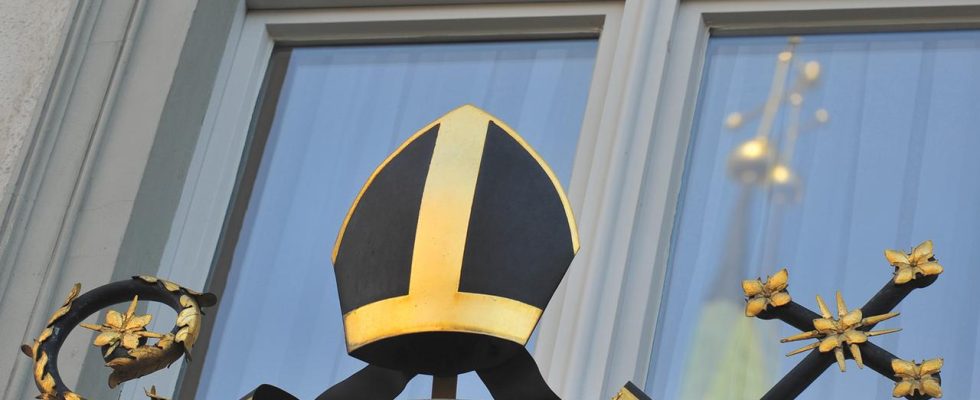The German bishops want to discuss at the spring general assembly how they deal with anti-democratic attitudes in the church. Critics are calling for stronger demarcation.
High-ranking Catholic clergy – like Bishop Stephan Ackermann in Trier – have recently been seen at demonstrations where rainbow flags are waved next to Nazis-Out posters.
Georg Bätzing demonstrated in Limburg, Peter Kohlgraf in Mainz, Michael Gerber in Fulda. All Catholic bishops. Just like Bertram Meier, who shouted to the crowd in Augsburg two weeks ago that everyone has the right to a humane life – regardless of whether they are children or old people, men or women, queer or straight.
But the Central Committee of German Catholics wants even more: the bishops have long been expected to take a joint and public stand on how the church views the AfD – and, above all, on how AfD members should be dealt with within the church.
Warning from bishops in East Germany
The German bishops now have the opportunity to do this. They will be holding their traditional spring general meeting in Augsburg until Thursday. Also on the program: consultations on the future of democracy in the election year 2024.
A consistent line in how the church deals with right-wing extremism has not yet been identified. Augsburg Bishop Bertram Meier told the “Augsburger Allgemeine” in the fall that party membership alone is not a criterion for excluding people. It’s about seeking conversation. “If we started to exclude people, we would be pushing them even more into an extreme corner.”
Other bishops expressed themselves more critically about the AfD, especially after the research network “Correctiv” reported on an alleged meeting of right-wing extremists and AfD members in Potsdam who are said to have discussed so-called “remigration”. Just over a week later, the bishops in East Germany warned in a joint statement against voting for the AfD in the upcoming state elections.
“Docking points” with right-wing Catholic Circling
Theologian Claudia Pfrang from the Competence Center for Democracy and Human Dignity of the Catholic Church in Bavaria would like the bishops to be more decisive. “A fire wall would be needed there too,” Pfrang told the BR. “That may be a steep thesis, but I wouldn’t like to imagine a meeting like the one in Potsdam taking place in a Catholic parish home, because there might be certain overlaps.”
Pfrang speaks of “docking points” between right-wing Catholic and right-wing nationalist circles – for example on the topics of gender order, family image, sexuality and protection of life. She suspects that this may be why it is difficult for some bishops to send a clear signal internally against right-wing extremism. They don’t want to lose believers who belong to “the hard core.”
There is no reliable information as to how widespread right-wing nationalist tendencies are in the church, says the theologian. However, she reports that more and more volunteers are turning to her center and asking for advice on how to deal with right-wing extremist positions in their communities. The competence center was founded in 2018 by Bavarian bishops to counteract anti-democratic developments in the church and society.
Incompatibility clause in Würzburg and Berlin
Like the Central Committee of German Catholics, Pfrang is also in favor of not allowing people to be elected to the parish council who express themselves in a clearly racist, anti-human or anti-democratic manner. Evidence of this could include statements on social media or a candidacy for the AfD. She points to Würzburg as a positive example.
Along with Berlin, Würzburg is the only diocese in Germany that has an incompatibility clause for parish councils. Since 2021, members of Würzburg parish councils can be excluded who support organizations or parties that represent racist, xenophobic or other views that violate human rights.
“We don’t want to have people on our committees who publicly violate our principles and human dignity,” says Anja Mantel BR. Mantel is deputy chairwoman of the diocesan council in the diocese of Würzburg. However, the clause has never been applied – perhaps because it does not seem so easy to implement in individual cases. “I can’t check everyone’s party books,” said Mantel.
In the end it always depends on the bishop
It’s not about the normal churchgoer, says Mantel. The aim is to prevent people with racist and xenophobic views from taking on positions in church committees.
Several dioceses are currently discussing whether rules like those in Würzburg or Berlin are also needed – for example in Freiburg, Erfurt or Magdeburg. But even if parishes want the rule themselves: in the end it always depends on the bishop. As a legislator, he must approve changes to canon law. And so many at the church base hope that the bishops can agree on a common line at their meeting in Augsburg.
Jasper Riemann, BR, tagesschau, February 19, 2024 3:08 p.m

